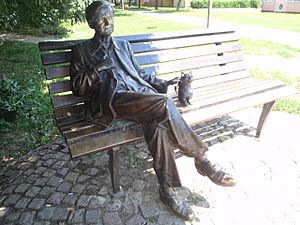Sándor Weöres facts for kids
Quick facts for kids
Sándor Weöres
|
|
|---|---|
 |
|
| Born |
Sándor Weöres
22 June 1913 Szombathely
|
| Died | 22 January 1989 (aged 75) |
| Occupation | Poet |
Sándor Weöres (born June 22, 1913 – died January 22, 1989) was a famous Hungarian poet and writer. He is known for his unique style and for writing many poems for children.
Sándor Weöres was born in Szombathely, a city in Hungary. He grew up in a small village nearby called Csönge. When he was just 14 years old, his first poems were published. This happened in an important magazine called Nyugat ("West"), thanks to its editor, the poet Mihály Babits.
Weöres went to the University of Pécs. He first studied law, but then changed to geography and history. He eventually earned a special degree in philosophy and art. His paper, called The Birth of the Poem, was published in 1939. In 1937, he traveled outside Hungary for the first time. He visited places like Manila, Vietnam, and India. During World War II, he had to do compulsory work, but he did not have to go to the front lines. After the war, he went back to Csönge and worked as a farmer for a short time.
In 1948, Weöres traveled again, living in Italy until 1949. In 1951, he moved to Budapest, the capital of Hungary, and lived there for the rest of his life. After 1948, it became very difficult for artists in Hungary to publish their work. Because of this, Weöres could not publish much until 1964.
Contents
Amazing Translations
Sándor Weöres was also a very talented translator. He translated many different works into Hungarian. These included poems by:
- Taras Shevchenko, a Ukrainian poet
- Shota Rustaveli, a Georgian poet
- Oton Župančič and Josip Murn Aleksandrov, Slovenian poets
He also translated an ancient Indian poem called Gita Govinda from Sanskrit. Weöres translated famous English works too, like Shakespeare's Venus and Adonis and Henry VIII. He also translated The Waste Land by T. S. Eliot, and funny poems by Edward Lear and Lewis Carroll. His translation of the ancient Chinese book Tao Te Ching is still the most popular one in Hungary.
His Lasting Impact
Many of Sándor Weöres' poems have been turned into music.
- The famous composer Zoltán Kodály created a choir piece using a poem Weöres wrote when he was only 14.
- György Ligeti, who was a friend of the poet, used several of Weöres' poems in his music piece Síppal, dobbal, nádihegedüvel.
- Composer Peter Eötvös used parts of Weöres' poem Néma zene ("Silent Music") in his pieces Atlantis and Ima. In 2013, he created Speaking Drums, which uses four of Weöres' poems for percussion and orchestra.
In 1980, the Hungarian filmmaker Gábor Bódy made a movie called Nárcisz és Psyché. This movie was based on Weöres' long poem Psyché.
His Books
Sándor Weöres wrote many books of poetry. Here are some of them:
Books in English
- Selected Poems, 1970
- Eternal Moment: Selected Poems by Sandor Weores, 1988
- Self-portrait: Selected poems by Sándor Weöres, 1991
Poetry Books in Hungarian
- Hideg van, 1934
- A kő és az ember, 1935
- A teremtés dicsérete, 1938
- Meduza, 1944
- A szerelem ábécéje, 1946
- Elysium, 1946
- Gyümölcskosár, 1946
- A fogok tornáca, 1947
- Bóbita, 1955
- A hallgatás tornya, 1956
- Tarka forgó, 1958
- Tűzkút, 1964
- Gyermekjátékok, 1965
- Merülő Saturnus, 1968
- Zimzizim, 1969
- Psyche, 1972
- Télország, 1972
- Priapos, written in 1950, published in 2001
See also
 In Spanish: Sándor Weöres para niños
In Spanish: Sándor Weöres para niños
 | Misty Copeland |
 | Raven Wilkinson |
 | Debra Austin |
 | Aesha Ash |

